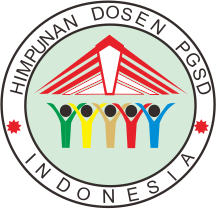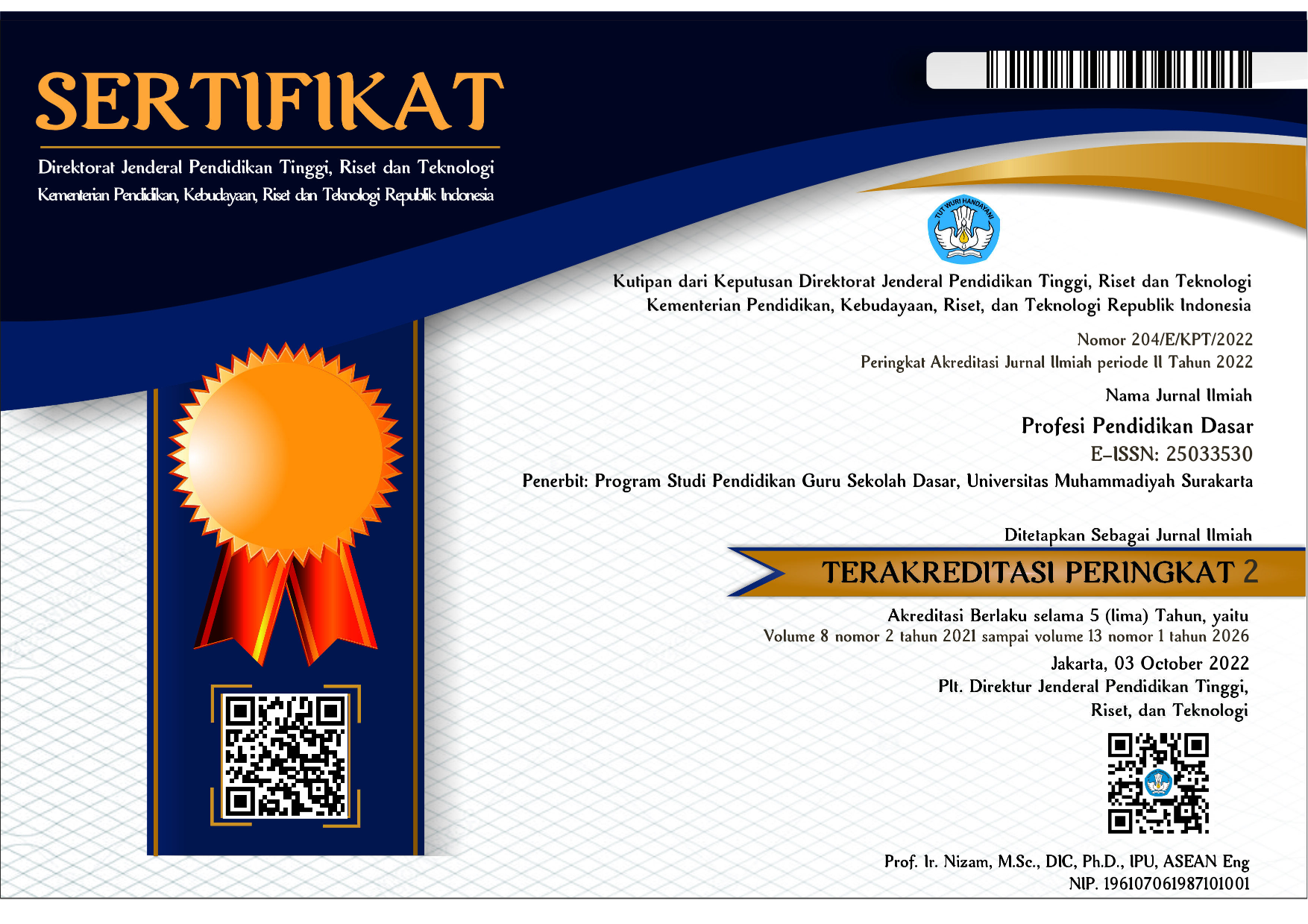Practitioners’ Perceptions of Play-Based Pedagogy on the Holistic Development of Young Children
Nonhlanhla Ntshangase(1), Roy Venketsamy(2*)(1) University of Pretoria
(2) University of Pretoria
(*) Corresponding Author
Abstract
South Africa has made remarkable progress in trying to improve early childhood education by introducing the National Curriculum Framework (NCF) in 2015. The NCF encourages practitioners to engage young children in play-based activities to improve their physical, social, emotional, and cognitive development, as core developmental skills. The main objective of this study was to explore practitioners’ perceptions of play-based pedagogy on the holistic development of young children. The qualitative approach was used to collect information through semi-structured interviews and lesson observations from five participants in the Mpumalanga Province. This study found that despite the Department of Basic Education mandating the implementation of play-based pedagogy in early childhood centers through the National Curriculum Framework challenges are experienced by practitioners. Practitioners had a good understanding of play-based pedagogy and play-based teaching and learning, but they needed continuous professional development and support to implement it in classrooms
Keywords
Full Text:
PDFReferences
Ali, E., Constantino, K. M., Hussain, A., & Akhtar, Z. (2018). The effects of play-based learning on early childhood education and development. Journal of Evolution of Medical and Dental Sciences, 7(43), 6808-6811..
Aronstam, S., & Braund, M. (2015). Play in Grade R classrooms: Diverse teacher perceptions and practices. South African Journal of Childhood Education, 5(3), 1–10. https://doi.org/10.4102/sajce.v5i3.242.
Ashari, Z. M., & Baharuddin, M. K. (2017). Play Based Pedagogy in PreSchool: A Meta Analysis Research. Man In India, 97(12), 237-243.
Aubrey, C. 2017. Sources of inequality in South African early child development services. South African Journal of Childhood Education, 7(1). https://sajce.co.za/index.php/sajce/article/view/450
Azungah, T. (2018). Qualitative research: Deductive and inductive approaches to data analysis. Qualitative Research Journal, 18(4), 383–400. https://doi.org/10.1108/QRJ-D-18-00035, 18(4): 383-400.
Baker, M., Krechevsky, M., Ertel, K., Ryan, J., Wilson, D., & Mardell, B. (2016). Playful Participatory Research: An emerging methodology for developing a pedagogy of play. Nine Edmonton.
Baumer, S. (2013). Play: Play pedagogy and playworlds | encyclopedia on early childhood development. https://www.child-encyclopedia.com/play/according-experts/play-pedagogy-and-playworlds.
Bubikova-Moan, J., Næss Hjetland, H., & Wollscheid, S. (2019). ECE teachers’ views on play-based learning: A systematic review. European Early Childhood Education Research Journal, 27(6), 776–800. https://doi.org/10.1080/1350293X.2019.1678717
Creswell, J. W., & Poth, C. N. (2016). Qualitative inquiry and research design: Choosing among five approaches. SAGE Publications.
Department of Basic Education (DBE). (2015). The South African National Curriculum Framework for young children from Birth to Four. Pretoria: Department of Basic Education.
Duci, V., Tahsini, I., & Voko, K. (2014). Role of teachers to support individual holistic development according to the age groups. Save the Children’s Resource Centre. https://resourcecentre.savethechildren.net/document/role-teachers-support-individual-holistic-development-according-age-groups/
Ekeh, M. C., & Venketsamy, R. (2021). Ensuring child-friendly learning environments in nigerian early childhood centers. In K. S. Adeyemo (Ed.), The Education Systems of Africa (pp. 677–703). Springer International Publishing. https://doi.org/10.1007/978-3-030-44217-0_37
Edwards, S. (2017). Play-based learning and intentional teaching: Forever different? Australasian Journal of Early Childhood, 42(2), 4–11. https://doi.org/10.23965/AJEC.42.2.01
Ellison, C. R. (2012). The importance of play in early childhood education [Thesis]. https://soar.suny.edu/handle/20.500.12648/5541.
Fleer, M. (2015). Pedagogical positioning in play – teachers being inside and outside of children’s imaginary play. Early Child Development and Care, 185(11–12), 1801–1814. https://doi.org/10.1080/03004430.2015.1028393.
Gasteiger, H. (2015). Early mathematics in play situations: Continuity of learning. In B. Perry, A. MacDonald, & A. Gervasoni (Eds.), Mathematics and Transition to School: International Perspectives (pp. 255–271). Springer. https://doi.org/10.1007/978-981-287-215-9_16.
Gastrow, M., & Oppelt, T. (2018). Big science and human development—What is the connection? South African Journal of Science, 114(11–12), 1–7. https://doi.org/10.17159/sajs.2018/5182
Goldstein, J. (2012). Play in Children’s Development, Health, and Well-Being. Brussels: Toy Industries of Europe.
Hassinger-Das, B., Zosh, J. M., Hirsh-Pasek, K., & Golinkoff, R. M. (2018). Playing to Learn Mathematics. Encyclopedia on Early Childhood Development. https://www.child-encyclopedia.com/play-based-learning/according-experts/playing-learn-mathematics.
Isaacs, S., Roberts, N., Spencer-Smith, G., & Brink, S. (2019). Learning through play in Grade R classrooms: Measuring practitioners’ confidence, knowledge and practice. South African Journal of Childhood Education, 9(1), 1–11. https://doi.org/10.4102/sajce.v9i1.704.
Kelly, R. S., Boulin, A., Laranjo, N., Lee-Sarwar, K., Chu, S. H., Yadama, A. P., Carey, V., Litonjua, A. A., Lasky-Su, J., & Weiss, S. T. (2019). Metabolomics and communication skills development in children; evidence from the ages and stages questionnaire. Metabolites, 9(3), 42. https://doi.org/10.3390/metabo9030042
Maher, C., Hadfield, M., Hutchings, M., & de Eyto, A. (2018). Ensuring rigor in qualitative data analysis: A design research approach to coding combining nvivo with traditional material methods. International Journal of Qualitative Methods, 17(1), 160940691878636. https://doi.org/10.1177/1609406918786362
Mardell, B., Wilson, D., Ryan, J., Ertel, K., Krechevsky, M., & Baker, M. (2016). Towards a pedagogy of play. Cambridge, MA: Harvard Graduate School of Education.
Morrow, V. (2011). Understanding Children and Childhood. Centre for Children and Young People: Background Briefing Series, no. 1. (2nd ed.). Lismore: Centre for Children and Young People, SouthernCross University..
Moser, A., & Korstjens, I. (2018). Series: Practical guidance to qualitative research. Part 3: Sampling, data collection and analysis. European Journal of General Practice, 24(1), 9–18. https://doi.org/10.1080/13814788.2017.1375091.
Mraz, K., Porcelli, A., & Tyler, C. (2016). Purposeful play: A teacher’s guide to igniting deep and joyful learning across the day. Heinemann.
Nicolopoulou, A. (2010). The alarming disappearance of play from early childhood education. Human development, 53(1), 1-4..
Nilsen, T. R. (2021). Pedagogical intentions or practical considerations when facilitating children’s play? Teachers’ beliefs about the availability of play materials in the indoor ECEC environment. International Journal of Child Care and Education Policy, 15(1), 1. https://doi.org/10.1186/s40723-020-00078-y.
Owen, G. T. (2014). Qualitative methods in higher education policy analysis: Using interviews and document analysis. The qualitative report, 19(26), 1.
Pandey, S., & Ashokan, V. (2018). Assessment of Birth Order on Learning Abilities among Late Adolescent. Online Submission, 8(12), 649-657.
Pellegrini, A. D., Symons, F., & Hoch, J. (2014). : A methodological primer, second edition (2nd ed.). Psychology Press. https://doi.org/10.4324/9781410610270
Polit, D. F., & Beck, C. T. (2009). Essentials of nursing research: Appraising evidence for nursing practice. Lippincott Williams & Wilkins.
Pyle, A., & Danniels, E. (2017). A continuum of play-based learning: The role of the teacher in play-based pedagogy and the fear of hijacking play. Early Education and Development, 28(3), 274–289. https://doi.org/10.1080/10409289.2016.1220771
Sarkar, D. (2020). A guide to holistic development for students. IDreamCareer. https://idreamcareer.com/blog/holistic-development/
Samuelsson, I. P., & Carlsson, M. A. (2008). The playing learning child: Towards a pedagogy of early childhood. Scandinavian Journal of Educational Research, 52(6), 623–641. https://doi.org/10.1080/00313830802497265
Siraj-Blatchford, I. (2009). Conceptualising progression in the pedagogy of play and sustained shared thinking in early childhood education: A Vygotskian perspective. Faculty of Social Sciences - Papers (Archive), 2–77. https://ro.uow.edu.au/sspapers/1224
Smidt, S. (2010). : The role of play in the early years. Routledge. https://doi.org/10.4324/9780203851999.
Solis, L., Khumalo, K., Nowack, S., Blythe-Davidson, E., & Mardell, B. (2019). Toward a south african pedagogy of play | project zero. http://www.pz.harvard.edu/resources/toward-a-south-african-pedagogy-of-play
Stirrup, J., Evans, J., & Davies, B. (2017). Early years learning, play pedagogy and social class. British Journal of Sociology of Education, 38(6), 872–886. https://doi.org/10.1080/01425692.2016.1182010.
UNICEF. (2018). Learning through play Strengthening learning through play in early childhood education programmes.
Vogt, F., Hauser, B., Stebler, R., Rechsteiner, K., & Urech, C. (2018). Learning through play – pedagogy and learning outcomes in early childhood mathematics. European Early Childhood Education Research Journal, 26(4), 589–603. https://doi.org/10.1080/1350293X.2018.1487160.
Wall, S., Litjens, I., & Taguma, M. (2015). Early childhood education and care pedagogy review: England. Organisation for Economic Co-operation and Development. http://www.oecd.org/edu/school/early-childhood-education-and-care-pedagogy-review-england.pdf
Weiland, C., & Yoshikawa, H. (2013). Impacts of a prekindergarten program on children’s mathematics, language, literacy, executive function, and emotional skills. Child Development, 84(6), 2112–2130. https://doi.org/10.1111/cdev.12099.
Weisberg, D. S., Hirsh-Pasek, K., & Golinkoff, R. M. (2013). Guided play: Where curricular goals meet a playful pedagogy: guided play. Mind, Brain, and Education, 7(2), 104–112. https://doi.org/10.1111/mbe.12015
Whitebread, D., Neale, D., Jensen, H., Liu, C., Solis, S.L., Hopkins, E., Hirsh-Pasek, K. Zosh, J. M. (2017). The role of play in children’s development: a review of the evidence (research summary). The LEGO Foundation, DK
Wolfgang, C., Stannard, L., & Jones, I. (2003). Advanced constructional play with LEGOs among preschoolers as a predictor of later school achievement in mathematics. Early Child Development and Care, 173(5), 467–475. https://doi.org/10.1080/0300443032000088212.
Wright, T. S. (2011). Countering the politics of class, race, gender, and geography in early childhood education. Educational Policy, 25(1), 240–261. https://doi.org/10.1177/0895904810387414.
Zosh, J. M., Hopkins, E. J., Jensen, H., Liu, C., Neale, D., Hirsh-Pasek, K., Solis, S. L., & Whitebread, D. (2017). Learning through play: a review of the evidence (white paper). The LEGO Foundation, DK.
Article Metrics
Abstract view(s): 2438 time(s)PDF: 1258 time(s)
Refbacks
- There are currently no refbacks.


















